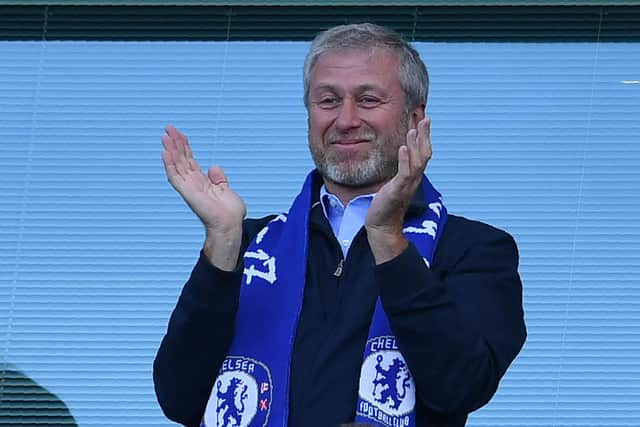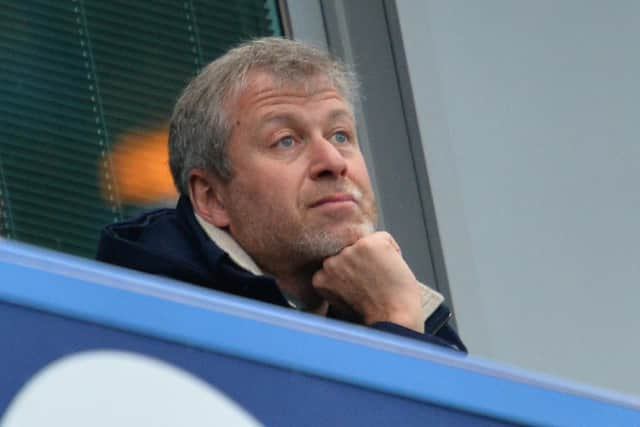Roman Abramovich sanctions: Where Chelsea owner Roman Abramovich lives, where Abramovich is now and net worth
After facing repeated calls from opposition Members of Parliament and other Western leaders to target more Russian oligarchs in sanctions on Russia following President Vladimir Putin’s invasion of Ukraine, Prime Minister Boris Johnson has now sanctioned Roman Abramovich.
The Chelsea Football Club owner is among a new list of wealthy Russian individuals added to the UK’s sanction list over continuing to have ties with the Russian president, who Mr Johnson has called a “bloodstained aggressor”.
Advertisement
Hide AdAdvertisement
Hide AdThe Prime Minister has faced increasing calls to extend sanctions and asset freezes to Abramovich since Putin launched his full scale invasion of Ukraine on Thursday February 24.
On March 15th, the UK sanctions against Roman Abramovich were expanded to include restricted rent payments to the Crown Estate, which manages properties owned by the Queen.
Here’s what you need to know about Roman Abramovich, his relationship to Putin, net worth and where he is now.
Why has Roman Abramovich been sanctioned?


Roman Abramovich, owner of Chelsea FC, has been sanctioned over his ties with Vladimir Putin in the UK’s stepped up sanctions on oligarchs accused of having the “blood of the Ukrainian people ... on their hands”.
Branded a pro-Kremlin oligarch, Abramovich was targeted with an asset freeze and a travel ban on Thursday after ministers came under sustained pressure to target him over Moscow’s ongoing invasion of Ukraine.
The UK’s updated sanctions list targets seven new elite individuals, with Abramovich targeted for having a “close relationship for decades” with Putin, which the football club owner has previously denied.
“This association has included obtaining a financial benefit or other material benefit from Putin and the government of Russia,” it said.


Foreign Secretary Liz Truss said the Government targeted the oligarchs to “ramp up the pressure on the Putin regime and choke off funds to his brutal war machine”.
Advertisement
Hide AdAdvertisement
Hide AdShe said: “With their close links to Putin they are complicit in his aggression.
“The blood of the Ukrainian people is on their hands. They should hang their heads in shame.”
Ministers issued a licence authorising Chelsea to continue playing matches, given the “significant impact” the sanctions will have.
Abramovich has stakes in steel giant Evraz and Russian mining company Norilsk Nickel.
He previously held a 73% stake in Russian oil firm Sibneft, which he sold to state-owned gas titan Gazprom for £9.87 billion in 2005.
Jets and yachts owned or chartered by Mr Abramovich can now be seized, the sanctions say.
Is Chelsea FC up for sale?
Abramovich has owned Chelsea since 2003.
His time as owner as seen the most successful period in the club’s history, winning numerous trophies such as the Champions League twice.
On March 2nd, The Telegraph reported in an exclusive that Abramovich has put the club up for sale for a reported sale price of £4 billion.
Advertisement
Hide AdAdvertisement
Hide AdThis comes after the owner put the care of the club into the hands of Chelsea’s foundation’s trustees.
"During my nearly 20-year ownership of Chelsea FC, I have always viewed my role as a custodian of the Club, whose job it is ensuring that we are as successful as we can be today, as well as build for the future, while also playing a positive role in our communities,” wrote Abramovich in a statement on the club’s website.
"I have always taken decisions with the Club’s best interest at heart. I remain committed to these values. That is why I am today giving trustees of Chelsea’s charitable Foundation the stewardship and care of Chelsea FC.
“I believe that currently they are in the best position to look after the interests of the Club, players, staff, and fans.”
The impact of sanctions on Abramovich, now labelled a “a pro-Kremlin oligarch” by the UK Government, will now see the attempted sale of Chelsea put on hold while Abramovich’s assets are frozen.
What is Roman Abramovich’s net worth?
Having first made his money following the collapse of the Soviet Union by buying state-owned assets at prices far below market value as part of Russia's controversial loans-for-shares privatisation program, Abramovich is worth an estimated £9.4billion.
Abramovich also served as Governor of Chukotka, the easternmost federal subject of Russia, from December 17th, 2000 until July 3rd, 2008.
What is Roman Abramovich’s nationality?
Roman Abramovich is a Russian oligarch, billionaire, businessman, and politician.
Advertisement
Hide AdAdvertisement
Hide AdThe football club owner has an Israeli passport, with which he travelled to the UK.
Roman Abramovich’s relationship to Vladimir Putin
Abramovich is believed to have been a confidante of former Russian president Boris Yeltsin and Vladimir Putin.
However, the club owner has strongly disputed statements suggesting his alleged closeness to Vladimir Putin and Russia, or that he has done anything to warrant sanctions against him.
However, as noted by Mr Bryant above, Abramovich did previously admit to paying for political influence and HMG believes he has “links to the Russian state and his public association with corrupt activity and practices”.
Forbes reported on February 24th that Abramovich has sanction insurance to the tune of several billion dollars.
On Tuesday, Abramovich was also named by MPs as one of 35 oligarchs identified by Russian opposition leader Alexei Navalny as “key enablers” of Putin’s leadership.
Where does Roman Abramovich live and where is he now?
Roman Abramovich owns a £125 million house in Kensington Palace, London, but was denied a Tier 1 investor’s visa back in 2018.
Abramovich has not been seen at Stamford Bridge for several months, suggesting he is not in the country, with his last trip to London in October 2021.
Advertisement
Hide AdAdvertisement
Hide AdThe Guardian reported on March 1 that Abramovich was moving quickly to sell his UK properties to avoid facing sanctions, according to comments made by Chris Bryant in the House of Commons.
"My anxiety is that we’re taking too long about these things,” the Labour MP said.
Sky News reported that Abramovich was seen in an Israeli airport and is now thought to have flown to Moscow.
Comments
Want to join the conversation? Please or to comment on this article.

